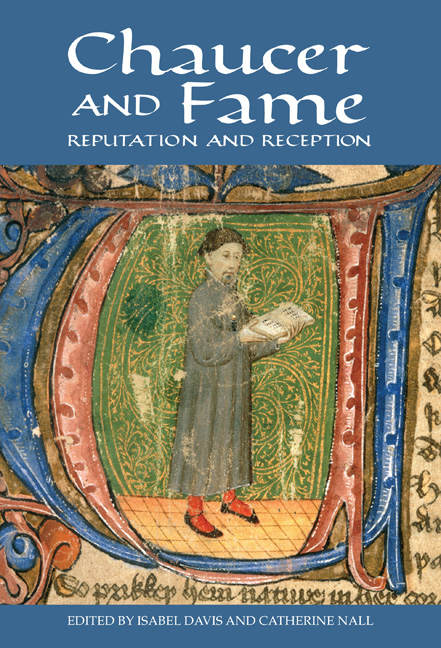Book contents
- Frontmatter
- Contents
- List of Illustrations
- List of Contributors
- Acknowledgements
- Introduction
- 1 Chaucer Joins the Schiera: The House of Fame, Italy and the Determination of Posterity
- 2 ‘I Wolde … han Hadde a Fame’: Dante, Fame and Infamy in Chaucer’s House of Fame
- 3 ‘And kis the Steppes where as thow Seest Pace’: Reconstructing the Spectral Canon in Statius and Chaucer
- 4 ‘I Nolde Sette at al that Noys a Grote’: Repudiating Infamy in Troilus and Criseyde and The House of Fame
- 5 The Early Reception of Chaucer’s The House of Fame
- 6 Fame’s Penitent: Deconstructive Chaucer Among the Lancastrians
- 7 After Deschamps: Chaucer’s French Fame
- 8 ‘Fresch Anamalit Termes’: The Contradictory Celebrity of Chaucer’s Aureation
- 9 Chaucer the Puritan
- 10 Revenant Chaucer: Early Modern Celebrity
- 11 Ancient Chaucer: Temporalities of Fame
- Bibliography
- Index
- Chaucer Studies
5 - The Early Reception of Chaucer’s The House of Fame
Published online by Cambridge University Press: 21 May 2021
- Frontmatter
- Contents
- List of Illustrations
- List of Contributors
- Acknowledgements
- Introduction
- 1 Chaucer Joins the Schiera: The House of Fame, Italy and the Determination of Posterity
- 2 ‘I Wolde … han Hadde a Fame’: Dante, Fame and Infamy in Chaucer’s House of Fame
- 3 ‘And kis the Steppes where as thow Seest Pace’: Reconstructing the Spectral Canon in Statius and Chaucer
- 4 ‘I Nolde Sette at al that Noys a Grote’: Repudiating Infamy in Troilus and Criseyde and The House of Fame
- 5 The Early Reception of Chaucer’s The House of Fame
- 6 Fame’s Penitent: Deconstructive Chaucer Among the Lancastrians
- 7 After Deschamps: Chaucer’s French Fame
- 8 ‘Fresch Anamalit Termes’: The Contradictory Celebrity of Chaucer’s Aureation
- 9 Chaucer the Puritan
- 10 Revenant Chaucer: Early Modern Celebrity
- 11 Ancient Chaucer: Temporalities of Fame
- Bibliography
- Index
- Chaucer Studies
Summary
Rather paradoxically, for a poem concerned with the dynamics of creating fame, Chaucer's House of Fame seems to have left only a fragmented impression on the consciousness of later writers and other readers. Allusions to it in the three centuries after Chaucer's death seldom make reference to its concern with the poet's own fame, and mostly address Fame as a personification, or the mechanics of fame's transmission. Several factors – some arising from the possibility that Chaucer left it unfinished, others from the absence of scribal attributions – have some relevance to what seem the rather limited written responses to the poem. Perhaps the most important factor is that of circulation. Only three manuscripts of The House of Fame survive: Oxford, Bodleian Library, MSS Fairfax 16 and Bodley 638, and Cambridge, Magdalene College, MS Pepys 2006. None of these surviving copies was produced before the middle of the fifteenth century, some fifty years – at the least – after the poem's actual completion. Other copies may have circulated, but in what numbers and to what extent is unclear.
Some of the transmissional vicissitudes to which The House of Fame was prey are demonstrated by the single reference to the poem made by the scribe John Shirley. Some time in the 1420s, in London, British Library, MS Additional 16165, after copying Lydgate's Complaint of the Black Knight, Shirley announced in the colophon (fol. 200v) ‘þat shalle nexst folowe þe hous of fame’. But the poem does not appear there. Although Shirley evidently knew of its existence and had a firm expectation of obtaining a copy, and although he was living in London, the centre of the metropolitan vernacular book trade, he was not able to find one or chose not to copy it.
It is difficult to interpret the significance of the chronological gap between the poem's completion and the production of these earliest surviving copies. If we are willing to believe that the earliest copies were read to destruction, the gap might possibly be construed as an indication of the poem's appeal. But, for whatever reasons, The House of Fame does not seem to have had a codicologically distinct identity. Perhaps the most likely reason for the absence of early manuscripts is that, as with others of Chaucer's works, little sustained authorial attempt was made to shape the patterns of its circulation.
- Type
- Chapter
- Information
- Chaucer and FameReputation and Reception, pp. 87 - 102Publisher: Boydell & BrewerPrint publication year: 2015
- 2
- Cited by

